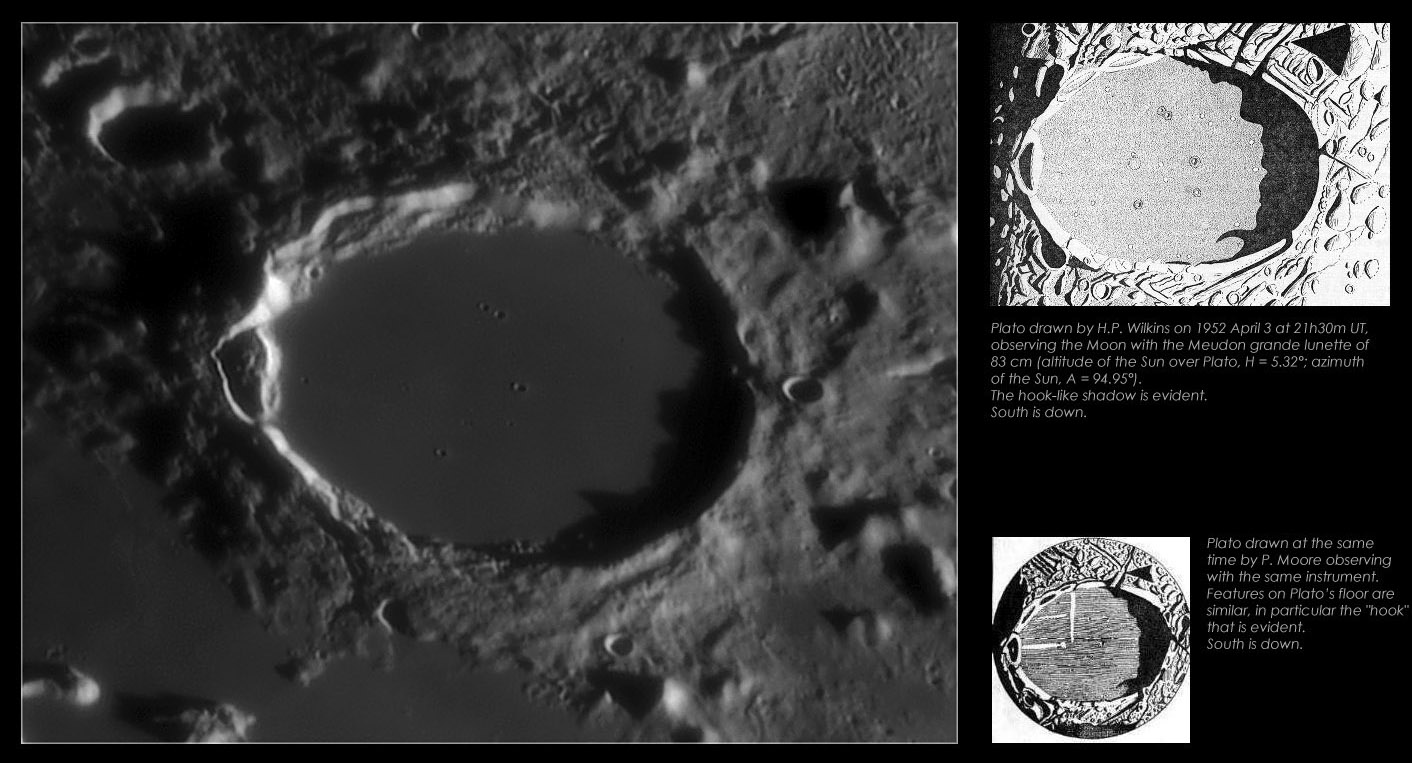Difference between revisions of "February 7, 2012"
| Line 3: | Line 3: | ||
<!-- ws:start:WikiTextHeadingRule:0:<h1> --> | <!-- ws:start:WikiTextHeadingRule:0:<h1> --> | ||
<!-- ws:start:WikiTextLocalImageRule:6:<img src="/file/view/LPOD-Feb7-12.jpg/299135418/LPOD-Feb7-12.jpg" alt="" title="" /> -->[[File:LPOD-Feb7-12.jpg|LPOD-Feb7-12.jpg]]<!-- ws:end:WikiTextLocalImageRule:6 --><br /> | <!-- ws:start:WikiTextLocalImageRule:6:<img src="/file/view/LPOD-Feb7-12.jpg/299135418/LPOD-Feb7-12.jpg" alt="" title="" /> -->[[File:LPOD-Feb7-12.jpg|LPOD-Feb7-12.jpg]]<!-- ws:end:WikiTextLocalImageRule:6 --><br /> | ||
| − | <em>image by [mailto:raffaele.barzacchi@gmail.com | + | <em>image by [mailto:raffaele.barzacchi@gmail.com Raffaele Barzacchi]</em><br /> |
<br /> | <br /> | ||
| − | Percy Wilkins and Patrick Moore famously drew a curved shadow cast by a peak on the east rim of Plato. Raffaele shows that the remarkably similar separate drawings by Wilkins and Moore don't look anything like images of Plato with nearly the same illumination. There have been other [http://www.glrgroup.eu/old/news/15.htm | + | Percy Wilkins and Patrick Moore famously drew a curved shadow cast by a peak on the east rim of Plato. Raffaele shows that the remarkably similar separate drawings by Wilkins and Moore don't look anything like images of Plato with nearly the same illumination. There have been other [http://www.glrgroup.eu/old/news/15.htm studies] failing to detect the hook, but Phil Morgan [http://britastro.org/blog/?p=121 reported] that it is visible, and Maurice Collins (marginally) confirmed that with LRO topographic data. On Raf's image the north side of the shadow is curved and the south side is relatively straight, giving the impression that the entire thing bends to the south. Also worth noticing is how bad the W&M drawings are for all of the peak shadows falling on Plato's floor, not just one of them. In the drawings the east wall shadow is relatively straight with a hump near the top/northeast. But Raf's excellent image shows a series of undulations of the shadow with a wide high spot in the middle. Perhaps W&M were so captivated by the hooked shadow that they didn't pay attention to the rest of the shadow, or perhaps the entire observation was inaccurate. But check Wilkin's original [http://britastro.org/blog/?p=121 sketch] in his observing notebook - it shows all of the shadows much more accurately than in the published drawing. This is evidence that the drawing was done with care, and so the most likely interpretation may be that W&M simply exaggerated the curve because of their excitement in discovering such a unique feature. <br /> |
<br /> | <br /> | ||
| − | <em>[mailto:tychocrater@yahoo.com | + | <em>[mailto:tychocrater@yahoo.com Chuck Wood]</em><br /> |
<br /> | <br /> | ||
<strong>Technical Details</strong><br /> | <strong>Technical Details</strong><br /> | ||
Revision as of 17:45, 11 January 2015
The Missing Hook Mystery

image by Raffaele Barzacchi
Percy Wilkins and Patrick Moore famously drew a curved shadow cast by a peak on the east rim of Plato. Raffaele shows that the remarkably similar separate drawings by Wilkins and Moore don't look anything like images of Plato with nearly the same illumination. There have been other studies failing to detect the hook, but Phil Morgan reported that it is visible, and Maurice Collins (marginally) confirmed that with LRO topographic data. On Raf's image the north side of the shadow is curved and the south side is relatively straight, giving the impression that the entire thing bends to the south. Also worth noticing is how bad the W&M drawings are for all of the peak shadows falling on Plato's floor, not just one of them. In the drawings the east wall shadow is relatively straight with a hump near the top/northeast. But Raf's excellent image shows a series of undulations of the shadow with a wide high spot in the middle. Perhaps W&M were so captivated by the hooked shadow that they didn't pay attention to the rest of the shadow, or perhaps the entire observation was inaccurate. But check Wilkin's original sketch in his observing notebook - it shows all of the shadows much more accurately than in the published drawing. This is evidence that the drawing was done with care, and so the most likely interpretation may be that W&M simply exaggerated the curve because of their excitement in discovering such a unique feature.
Chuck Wood
Technical Details
May 11, 2011, 21:17 UT. C14+ ccd PT Chameleon + filter R+IR Edmund optics + Barlow televue 2x; Avistack, Iris, PS.
Related Links
Rükl plate 4



